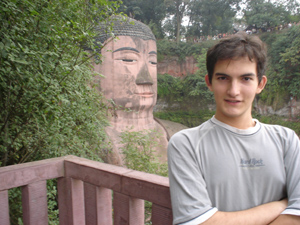

Venture Boldly

In the basement of the Sharvy G. Umbeck Science-Mathematics Center, with a researcher’s logic and the perfectionism of a soon-to-be med student, Mark Munoz ‘08 is making waves in neuroscience -- and perhaps putting his research and Knox College on the scientific map.
“I first became interested in researching a stroke while I interned in a neuroscience intensive care unit during the summer,” he says.
A stroke occurs when a clot blocks a blood vessel and starves the other cells of oxygen fed by that blood vessel. It is the third leading cause of death in the United States.
As an undergraduate student, Munoz came to Knox College for the express purpose of studying medicine. He studied abroad in China, during his junior year, at Whashan Hospital. But it is his undergraduate training in neuroscience that is taking him to medical school.
“I chose neuroscience because I felt that I would learn more about the relationship between the brain and behavior in an interdisciplinary field that includes psychology, biology, and chemistry,” he says.
In his research, Munoz examined an effective therapy already known for helping stroke victims. According to Munoz, hypothermia has been shown in experiment therapy to reduce brain damage. But when used in a clinical setting, it can have serious side effects. “Many of the organs in the body have to work at certain temperatures. If you change that temperature, a lot of things can happen,” Munoz says.
His research took him to the TRPM8 receptor. It is a receptor that responds to the sensation of cold without changing temperature.
“I thought I would be able to use menthol to mimic cold and explain the mechanism of how hypothermia works and identify it as a useful therapy for protecting the brain from damage without running any of the nasty side effects of hypothermia.”
In his clinical studies, Munoz was able to produce a marked decline in brain tissue/cells destroyed by the stroke. “The control rats had pretty severe strokes. While the group administered menthol had a highly reduced average of the stroke with only a small percent of cell/tissue destroyed.”
According to Munoz, the results have important implications. “It could explain how hypothermia is working in the brain. It suggests there is some sort of cellular pathway for transmitting cold information. The other finding is that menthol can be a useful therapy in the clinic for acute stroke.”
The neuroscience program is fairly young at Knox. But it is arguably the most promising “- and intellectually challenging - time to be entering the field of neuroscience,” Munoz estimates. The program allows students and faculty to venture beyond descriptive studies, into the realm of true experiments. He is now replicating his experiment and even looking at finding ways to reverse the damage of a stroke.
For a long time Munoz says that he was not sure what field he wanted to pursue. “Knox was helpful because it sort of allowed me to take charge of what I was doing.”
Knox’s neuroscience program provides ample research opportunities for those with an adventurous spirit. “I don’t know a school this size with this kind of program,” he says.
Students analyze genes, cognitive disorders or normal processes. They learn biology, psychology, chemistry, and even philosophy. “Neuroscience is perfect for a liberal arts education because it is one of the most interdisciplinary majors I can think of,” Munoz says.

Mark Munoz '08 studied at Whashan Hospital in China during his junior year, but it is his undergraduate work in neuroscience that is sending him to medical school.
Published on May 08, 2008